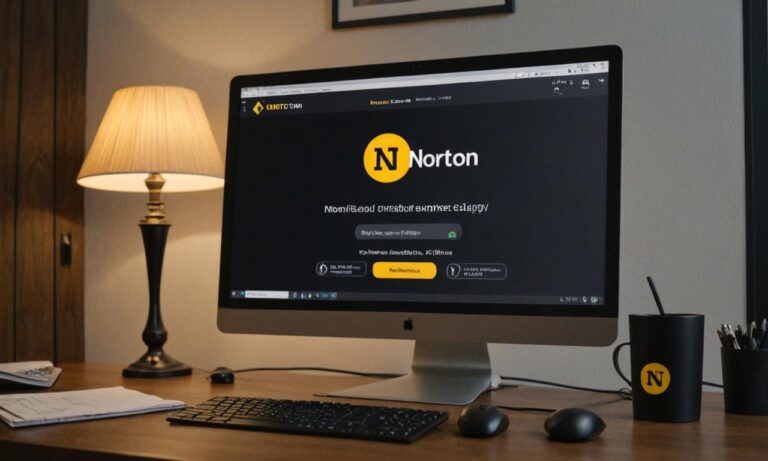Norton email scams are on the rise, with cybercriminals using increasingly sophisticated tactics to trick consumers into revealing sensitive information or sending money. In this article, we’ll explore how to identify and avoid these scams, protecting yourself from financial loss and identity theft.
As someone who has been using Norton products for years, I have seen firsthand how scammers attempt to impersonate the company through fake emails and renewal invoices. It can be challenging to distinguish between legitimate communications and fraudulent ones, but with the right knowledge and vigilance, you can protect yourself from falling victim to these scams.
I once received an email claiming to be from Norton, asking me to renew my subscription by clicking on a link and providing my credit card information. Upon closer inspection, I noticed that the email address was slightly different from the official Norton domain, and the language used in the email seemed suspicious. I’m glad I trusted my instincts and avoided what could have been a costly mistake.
How to Identify and Avoid Norton Email Scams
One of the most common tactics used by scammers is to send fake emails that appear to come from Norton. These emails often include urgent language, claiming that your subscription is about to expire or that your account has been compromised. They may also contain links to phishing websites designed to steal your personal information.
To protect yourself from these scams, it’s essential to verify the legitimacy of any email claiming to be from Norton. Check the sender’s email address carefully, looking for slight variations or misspellings. Be wary of fake invoices or product names that don’t match your actual subscription.
If you’re unsure about an email, don’t click on any links or provide personal information. Instead, go directly to the official Norton website and log in to your account to check the status of your subscription.
Common Tactics Used in Norton Subscription Renewal Scams
Scammers often use subscription renewal phishing tactics to trick consumers into revealing sensitive information or sending money. These fake Norton 360 renewal invoices may claim that your subscription is about to expire and that you need to take immediate action to avoid losing protection.
These scams can be particularly convincing, as they often use official-looking logos and branding. However, there are usually telltale signs that the email is fraudulent, such as poor grammar, generic greetings, or a sense of urgency that seems out of place.
Remember, Norton will never ask you to provide sensitive information via email or threaten to cancel your subscription if you don’t take immediate action. If you receive a suspicious renewal email, report it as spam and delete it from your inbox.
Protecting Yourself Against Norton-Related Phishing Scams
In addition to being cautious with emails, there are several steps you can take to protect yourself against Norton-related phishing scams. First, ensure that you have a reliable security solution in place, such as Norton 360 Deluxe, which offers protection against hackers, malware, and online scams.
Second, be vigilant when browsing the web or checking your email. Avoid clicking on links from unknown sources, and be cautious of attachments or downloads that you weren’t expecting.
Finally, if you do encounter a suspected scam, report it to Norton and other relevant authorities. By working together to identify and shut down these scams, we can help protect others from falling victim to these malicious tactics.
According to cybersecurity expert, Dr. Alicia Kozlowski, “The best defense against phishing scams is a combination of awareness, caution, and robust security tools. By staying informed about the latest tactics used by scammers and maintaining a healthy sense of skepticism, consumers can significantly reduce their risk of falling victim to these crimes.”
What to Do if You Fall Victim to a Norton Email Scam
If you believe you’ve fallen victim to a Norton email scam, it’s essential to take immediate action to minimize the potential damage. First, change your passwords for any accounts that may have been compromised, and consider updating your PIN numbers for added security.
Next, contact Norton’s support team to report the scam and seek guidance on any additional steps you should take. They may be able to assist with a coordinated investigation or takedown efforts to prevent future scams and help protect other potential victims.
Finally, monitor your financial accounts closely for any suspicious activity, and consider placing a fraud alert on your credit report to help prevent identity theft.
Real-World Examples of Norton Email Scams in Action
To illustrate the sophistication of these scams, let’s look at a few real-world examples. In one case, scammers sent out fake notification emails claiming to be from NortonLifeLock, requesting that users renew their antivirus system by clicking on a link and providing their personal information.
The emails contained official-looking logos and custom IDs, making them appear legitimate at first glance. However, upon closer inspection, the invoice numbers and email addresses were found to be fraudulent.
In another example, scammers targeted individuals through cold calls and pop-up messages, claiming to be from Norton’s technical support team. They attempted to convince victims to grant remote access to their computers, allowing the scammers to install malware or steal sensitive information.
| Scam Type | Identifying Features | Protection Measures |
|---|---|---|
| Fake Renewal Emails | Suspicious sender address, urgent language, fake invoice numbers | Verify email legitimacy, avoid clicking links, report spam |
| Technical Support Scams | Unsolicited calls, pop-up messages, requests for remote access | Hang up on suspicious calls, close pop-ups, contact Norton directly |
Staying Vigilant: The Importance of Scam Awareness and Prevention
As cybercriminals continue to evolve their tactics, it’s crucial that consumers remain vigilant and take proactive steps to protect themselves from scams. This includes being cautious of unsolicited emails, calls, and pop-up messages, as well as ensuring that they have robust security measures in place, such as two-factor authentication (2FA).
By staying informed about the latest scam trends and best practices for online security, you can significantly reduce your risk of falling victim to financial fraud and identity theft. Remember, if an offer seems too good to be true or a request for personal information feels suspicious, trust your instincts and take steps to verify the legitimacy of the communication.
In conclusion, Norton email scams pose a significant threat to consumers, but by being aware of the tactics used by scammers and taking proactive measures to protect yourself, you can navigate the digital landscape with confidence. Stay vigilant, trust your instincts, and don’t hesitate to seek help if you believe you’ve fallen victim to a scam.
See also:
- Beware of Fake McAfee Emails: Identifying and Avoiding Invoice Scams
- Beware of Coinbase Scams: How to Protect Your Crypto and Avoid Phishing Attacks
- Beware of the Domain Listings Scam: Protect Your Online Business
- Beware the Meta Business Suite Message Scam: Don’t Fall for Fake Warning Messages
- Beware: The Latest UPS Text Scams Targeting Package Deliveries






